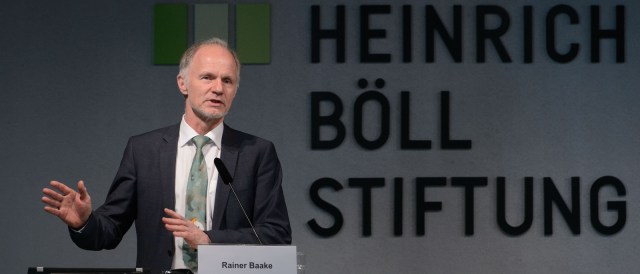Last Thursday, the Who’s Who of Germany’s Energiewende met in Berlin to discuss the future of Germany’s transition to renewables. While agreement among participants existed over the Energiewende’s success story to date, opinions differed on the right path to the future. Alexander Franke says that 2014 will be a decisive year for the success of Germany’s ambitious project.

Rainer Baake speaking at the Heinrich Böll Stiftung. (Photo: Stephan Röhl, license: CC BY-SA 2.0)
Invited by the Heinrich Böll Stiftung, experts and the interested public met on February 13, 2014 to discuss the future of Germany’s transformational change towards renewables called “Energiewende 2.0”. The motto was chosen deliberately: There is broad agreement that energy policies need to be adapted to a new reality in which more than a quarter of electricity comes from renewable sources. This development entails a number of new challenges still unknown to electricity markets dominated by central fossil fuel power plants for baseload. Such issues include market integration and capacity markets.
Rainer Baake, Undersecretary in the Ministry of Economics and Energy (and hence the Energiewende) summarized the government’s reform plans, all aimed at lowering the price per kilowatt-hour in Germany.
The government wants to make direct marketing of electricity mandatory for all new renewable energy projects by 2017, an idea that Baake endorsed while he was still at the research institute Agora. The aim is to make new renewable projects’ electricity production match energy demand more closely – a kilowatt-hour of renewable electricity might be more valuable at times with little sun and wind. Renewable power producers would then have an incentive to align their production with demand, which could make the renewable support scheme more efficient. Yet a study by IZES (PDF in German) argues that direct marketing might actually hurt the energy transition and make it more expensive – by forcing renewables to adopt to a market dominated by inflexible fossil fuel power plants instead of the other way around. Direct marketing and the resulting red tape – not to mention uncertain returns on investments – might therefore burden individual owners and cooperatives.
Baake demands to end “excessive” payments for specific renewable technologies as PV and onshore wind power have clearly won the cost race. He reiterated the need to establish a growth corridor for renewables. Unfortunately, the government openly contradicts itself by continuing support for expensive offshore wind power, a type of investment usually only open to bigger institutional investors.
The conference participants criticized the tendency to equate the energy transition with renewable electricity and renewable electricity with the Renewable Energy Act (EEG). Uwe Nestle, independent advisor on energy policy, argued that the blame for high energy costs was unfairly attributed to the EEG, a policy that has been key to Germany’s success.
The debate was also overshadowed by plans by the European Commission to investigate and possibly revoke industry exemptions to the renewables surcharge and, much worse, a possible decision to ban feed-in tariffs altogether in favor of tenders. Yet, the latter would turn the ownership structure of the Energiewende upside down, as it would become increasingly difficult for farmers, homeowners and coops to compete for bids. Ironically, utilities would be favored over over broad citizen ownership in the name of competition. As democratization of energy ownership is one of the core reasons for continous social support for the Energiewende in Germany, such a move might reduce its legitimacy.
Therefore many discussants, such as Johannes Remmel, Minister for Climate Protection and Environment in the State of Northrhine-Westphalia, and Prof. Klaus Töpfer, former director of UNEP, demanded stronger proactive engagement from the German government at the European level, including advocating strict 2030 climate goals. Member states are discussing whether these goals should include a goal for efficiency and a renewables share (something Germany traditionally used to support) or be simply reduced to CO2 emission reductions (which could include technologies such as nuclear or CCS as supported by the UK government). Participants agreed that the time had come to think the Energiewende European; instead of complaining about Brussels, the German government should build a European advocacy coalition for renewables.
After all, what’s at stake is the continued success story of the German Energiewende. And a success story it is: prices for new onshore wind capacity and PV are already cheaper than the cost for comparable fossil fuel power today (and we aren’t even talking about nuclear here). Thanks to its feed-in tariffs, Germany has come a long way as the pioneer in the diffusion of renewable energy technologies, bringing costs down while at the same time democratizing the electricity sector and thus gaining and maintaining broad popular support for its plans.
The coming months will be a battle for political support at the domestic and European level about nothing less than the paradigm of the energy system: will the old industrial energy mammoths be able to discredit and legally hinder the broad distribution of distributed renewables (and the resulting distribution of wealth) and replace it once again with a centralized, fossil-based energy system that includes renewables only insofar as they fit into the utilities’ agendas? Technical and social progress are not on their side, but political majorities might be.